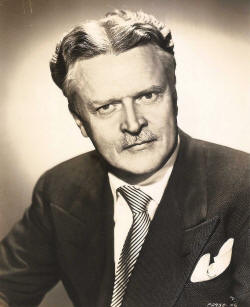 Charles
William Brackett (November 26, 1892 – March 9, 1969) was an American novelist,
screenwriter, and film producer, best known for his long collaboration with
Billy Wilder.
Charles
William Brackett (November 26, 1892 – March 9, 1969) was an American novelist,
screenwriter, and film producer, best known for his long collaboration with
Billy Wilder. Queer Places:
Harvard University (Ivy League), 2 Kirkland St, Cambridge, MA 02138
10601 Bellagio Rd, Los Angeles, CA 90077
Greenridge Cemetery
Saratoga Springs, Saratoga County, New York, USA
 Charles
William Brackett (November 26, 1892 – March 9, 1969) was an American novelist,
screenwriter, and film producer, best known for his long collaboration with
Billy Wilder.
Charles
William Brackett (November 26, 1892 – March 9, 1969) was an American novelist,
screenwriter, and film producer, best known for his long collaboration with
Billy Wilder.
Brackett was born November 26, 1892 in Saratoga Springs, New York, the son of Mary Emma Corliss and New York State Senator, lawyer, and banker Edgar Truman Brackett. The family's roots traced back to the arrival of Richard Brackett in the Massachusetts Bay Colony in 1629, near present-day Springfield, Massachusetts. His mother's uncle, George Henry Corliss, built the Centennial Engine that powered the 1876 Centennial Exposition in Philadelphia. A 1915 graduate of Williams College, he earned his degree from Harvard University. He joined the Allied Expeditionary Force during World War I. He was awarded the French Medal of Honor.
Brackett married Elizabeth Barrows Fletcher, a descendant of Stephen Hopkins of the Mayflower, on June 2, 1919, in Indianapolis, Indiana. They had two daughters, Alexandra Corliss Brackett (1920–1965), who married James Matthew Larmore in 1942, and Elizabeth Fletcher Brackett (1922–1997).
Brackett was a frequent contributor to the Saturday Evening Post, Collier's, and Vanity Fair, and a drama critic for The New Yorker from 1925-29. He wrote five novels: The Counsel of the Ungodly (1920), Week-End (1925), That Last Infirmity (1926), American Colony (1929),[1] and Entirely Surrounded (1934). In American Colony (1929) one of the characters, Sydney, is a gay man living among upper-crust straight friends.
Brackett was president of the Screen Writers Guild (1938–1939). He was president of the Academy of Motion Picture Arts and Sciences from 1949 through 1955. Brackett either wrote or produced over 40 films during his career, including To Each His Own, Ninotchka, The Major and the Minor, The Mating Season (1951), Niagara, The King and I, Ten North Frederick, The Remarkable Mr. Pennypacker, and Blue Denim.
There was something dark behind Charlie Brackett's glory. "It was a very weird, dark, Hollywood drama," said Gavin Lambert, who, as a young writer in Hollywood, was embraced by Brackett and his crowd. "Charlie was one of the first people I met when I came out here. I'd go to the Sunday lunches at his house. They were all very Hollywood establishment. I got to know Charlie fairly well. There was a certain subtext between us. We didn't have to discuss it. He knew I was gay, I knew he was." What Lambert didn't know for certain, however, was the exact nature of the relationship between Charlie and the young man who acted as his assistant on several pictures, the young man Charlie had arranged to marry his daughter Alexandra, or "Zan," as everyone called her. His name was James Matthew Larmore. Photographs reveal a strikingly handsome youth with deep-set eyes and full lips. He'd appeared in the play "Russet Mantle" and come to Hollywood as part of the "Winged Victory" company after WWII, whereupon he acted in several pictures before becoming Brackett's assistant. And son-in-law. And most likely lover.
Lambert stated he believed the stories of a lover relationship between Brackett and Larmore to be true. Christopher Isherwood believed them as well. "It was an accepted fact among everyone," said Isherwood's lover, Don Bachardy, who was often both guest and host of Brackett. The playwright John Van Druten, a mutual friend, reportedly knew the affair as a fact, having been a confidant of borth Brackett and Larmore. "One just knew," said Bachardy. "They'd be together and one just knew. It's not as if we could have asked him. It was out of the question to be intimate in that wasy with Charlie."
From 1936-50, Brackett worked with Billy Wilder as his collaborator on thirteen movies, including The Lost Weekend (1945) and Sunset Boulevard (1950), which won Academy Awards for their screenplays.
Elizabeth Fletcher Brackett the elder died on June 7, 1948.
"Charlie is an example of someone who was just totally, totally in the closet, totally circumspect," said Gavin Lambert. "And I think ultimately it affected his work. I think in some sense that's why he and Billy Wilder split up. Charlie did not want to go too far. He thought Sunset Boulevard was too ghastly. He won an Oscar for it, but he wanted nothing to do with it. He felt Wilder had become just too unconventional." Indeed, much of Brackett's post-Wilder career is little more than fluff: Titanic (1953), The Girl in the Red Velvet Swing (1955), Edmund Goulding's Teenage Rebel (1956).
The duo's professional partnership ended in 1950, after the completion of Sunset Boulevard. Brackett then went to work at 20th Century-Fox as a screenwriter and producer. His script for Titanic (1953) won him another Academy Award. He received an Honorary Oscar for Lifetime Achievement in 1958.
In 1953, Brackett married his sister-in-law (Elizabeth's sister, Lillian Fletcher); that union was childless.[2] Both Larmore and his daughter Alexandra died due to alcoholism.
Charles Brackett died, a lonely and confused man, on March 9, 1969, aged 76, in Beverly Hills, California.[3] His diaries covering the years 1932 until the breakup with Wilder were edited by Anthony Slide under the title It's the Pictures That Got Small: Charles Brackett on Billy Wilder and Hollywood's Golden Age (Columbia University Press, 2014).
My published books: